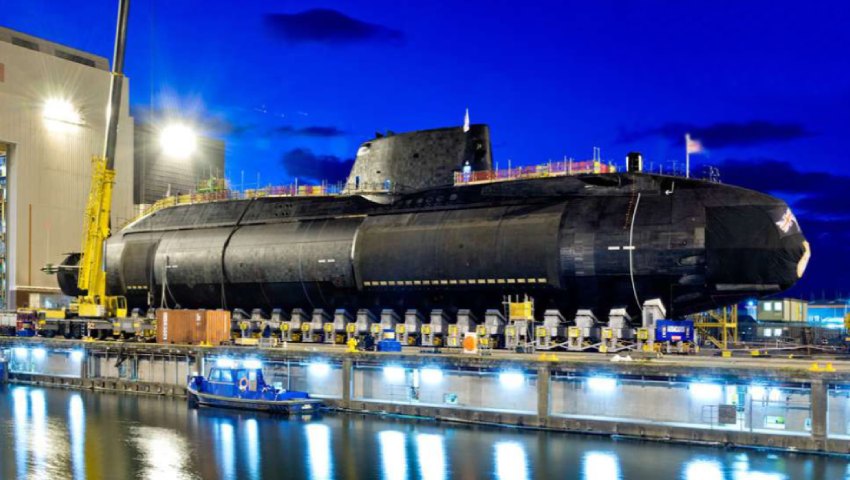Has Australia bitten off more than it can chew with its latest submarine procurement strategy under AUKUS?
To continue reading the rest of this article, please log in.
Create free account to get unlimited news articles and more!
The newly established AUKUS alliance — which promises the delivery of at least eight nuclear-powered submarines built in Australia as part of a knowledge-sharing arrangement — has largely been welcomed by the political class and stakeholders across Defence and defence industry.
Supporters have touted the capability benefits of a nuclear-powered submarine fleet, as well as the long-term advantages associated with accessing cutting-edge technology developed in the US and the UK.
However, some observers doubt the deal can deliver on its promises.
According to Geoff Crittenden, CEO of industry group Weld Australia, the nation does not have the infrastructure, skills or experience for a timely delivery of the nuclear-powered fleet.
“There was general consensus that building the Attack Class submarines would be a challenge for Australian industry — building nuclear-powered submarines presents an inordinate number of issues,” he writes.
“The skills, knowledge and expertise required to build a submarine are akin to those required to build a space craft chartered for the moon. Building a nuclear submarine is equivalent to building a space craft set for Mars and beyond. It is an entirely new quantum.”
Crittenden argues that without an existing nuclear industry, it would be difficult for industry partners to meet the local industry content requirements included in Defence contracts.
“While ambitious, the federal government’s local content requirements are of enormous benefit to Australian industry,” he notes.
“However, without exception, they have been extremely difficult to execute effectively on recent Defence projects."
The Weld Australia CEO lists a number of challenges to achieving such targets, including:
- the complexity of the project, requiring a highly skilled workforce and investments in cutting-edge technology and rapid upskilling;
- the involvement of global contractors with priorities that extend beyond Australia’s borders; and
- the local industry’s inability to keep up with the speed and scale of delivery expectations.
“In some areas, and across some skillsets, there are gaps in the local industry. And this is in industries in which Australia already has proven experience—let alone nuclear power,” Crittenden continues.
“Mandating local industry content requirements is a powerful government tool that affords many benefits, but it is impossible to create industry capability and capacity overnight.
“As a result, the defence prime contractors can find themselves stuck between a rock and a hard place — the balance between delivering on time and on budget, and meeting local industry content requirements becomes unworkable.”
Crittenden goes on to lament the local skills shortage, claiming it is unlikely the next-generation submarines would be built in Australia, given the absence of welders in Australia certified to the standards required for nuclear-powered vessels.
“This will obviously impact local industry content requirements, as well as upskilling, technology transfer and the shipbuilding workforce in general,” he adds.
Australia would also need to invest in infrastructure capable of handling nuclear reactors during both the construction and maintenance phases.
“It’s highly unlikely that the people of Port Adelaide will warm to a nuclear facility located on their back doorstep. So, where is the federal government planning to situate this facility?” Crittenden writes.
He also flags crewing concerns, noting a lack of skilled nuclear engineers and captains.
“It takes years and years of experience to captain a nuclear submarine; Australia effectively needs mariners in training now to ensure they’re ready to captain submarines when construction is complete,” he observes.
“Australia already struggles to crew its Collins Class submarines, which need up to 50 people aboard. The US Fast Attack submarines require crews of around 130 people. How will Australia bridge this shortfall?”
In light of these obstacles, Crittenden claims it is unlikely nuclear-powered submarines would enter service until the 2040s, by which time the technology “could be obsolete”.
Crittenden concludes by questioning whether taxpayers should bear the cost of what he describes as the federal government’s “pipedream project”.
The Weld Australia CEO suggests the government may instead decide to purchase the vessels directly from the US or the UK.
“While there is no simple solution, the construction, operation and maintenance of nuclear submarines without a local nuclear industry will be challenging,” he writes.
“Industry will need to stand by for clarification from the federal government.”
Get involved with the discussion and let us know your thoughts on Australia’s future role and position in the Indo-Pacific region and what you would like to see from Australia's political leaders in terms of partisan and bipartisan agenda setting in the comments section below, or get in touch with
Charbel Kadib
News Editor – Defence and Security, Momentum Media
Prior to joining the defence and aerospace team in 2020, Charbel was news editor of The Adviser and Mortgage Business, where he covered developments in the banking and financial services sector for three years. Charbel has a keen interest in geopolitics and international relations, graduating from the University of Notre Dame with a double major in politics and journalism. Charbel has also completed internships with The Australian Department of Communications and the Arts and public relations agency Fifty Acres.

 Login
Login








